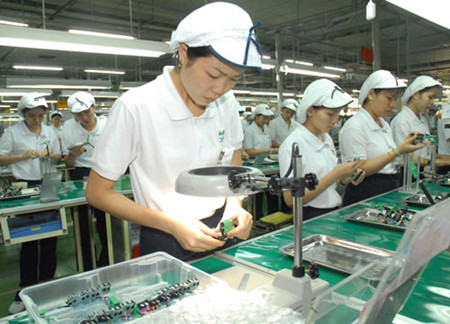Renewing policies to attract more FDI
By the end of last month, Vietnam had attracted nearly US$13 billion from foreign direct investment (FDI), a year-on-year increase of 47%.

This proves Vietnam has become an attractive destination for foreign investors. But the country still needs more new policies to draw in investment projects using advanced technologies and ensuring environmental safety.
Statistics by the Ministry of Planning and Investment show that Vietnam lured in almost US$13 billion of foreign direct investment (FDI) over the past seven months of 2016, with a sharp rise in both the number of registered projects and the amount of committed capital.
FDI companies contribute about 20% of the total state budget and 20% of the national GDP.
According to Vietnam’s Association of Foreign Invested Enterprises, FDI has proven itself is a driving force for national economic growth this year, which has seen the biggest ever increase in disbursement.
Specifically, implemented FDI grew 12% last year, the highest rate over the past fifteen years.
Nguyen Van Toan, Deputy President of Vietnam’s Association of Foreign Invested Enterprises, said, “This year’s FDI data illustrates a positive outcome for the integration process. More disbursement means foreign investors feel secure about the host country’s investment environment, and it demonstrates that Vietnam has been good at attracting foreign investment.”
Despite these achievements, the increase in FDI presents many obstacles and has negative consequences for the environment and business performance.
Associate Professor To Trung Thanh of the National Economics University said that when foreign companies make low tech investments in Vietnam, it will have a serious impact on the environment and cannot help Vietnam to raise its technological capacity.
“Statistics from Data of the Ministry of Planning and Investment reveal that over the past 25 years, 80% of the technologies used by FDI companies in Vietnam are average technologies and only 6% of FDI companies have used advanced technologies," Thanh said.
"If we still depend on FDI to grow, we must accept the fact that most FDI businesses investing in Vietnam are here to make the most of its natural resources and low labor costs. Their technologies are low and bring in little added value,” he noted.
Do Nhat Hoang, head of the Foreign Investment Department of the Ministry of Planning and Investment, underscored the need to make a comprehensive evaluation of FDI to outline appropriate policies to improve its effectiveness.
He said, “Management decentralization is a good guideline. But we should take into consideration how to manage post-decentralization and issue regulations on management decentralization with the aim of making more reforms."
"Moreover, recent government resolutions have clarified the management of foreign investment and how to make FDI useful for Vietnam, especially as regards to environmental protection, social responsibility, and dealing with violations of the law by foreign investors,” he added.
To fully tap the FDI for national economic development and improve Vietnam’s status in the world, economists said policies aimed at attracting FDI from now until 2020 should focus on specific areas and prioritize production activities with more added value and high-tech investment projects.
VOV5
 To clear bottlenecks, make good use of FTAs
To clear bottlenecks, make good use of FTAs
 Vietnam balances supply and demand to prepare for Tet shopping season
Vietnam balances supply and demand to prepare for Tet shopping season
 Developing Bac Tan Uyen district into a town in the period 2030-2040
Developing Bac Tan Uyen district into a town in the period 2030-2040
 Accompanying investors for sustainable development
Accompanying investors for sustainable development
 Tan Uyen: Flexible adaptation, stable growth
Tan Uyen: Flexible adaptation, stable growth
 Tax revenue management boosted and modernized
Tax revenue management boosted and modernized
 To build synchronous infrastructure, facilitate new era development
To build synchronous infrastructure, facilitate new era development
 Bau Bang aims to become a center of innovation and industry
Bau Bang aims to become a center of innovation and industry
 Processing and manufacturing industry makes high efforts, gains good growth
Processing and manufacturing industry makes high efforts, gains good growth
 Enterprises assisted to enhance product quality and elevate competitiveness
Enterprises assisted to enhance product quality and elevate competitiveness






